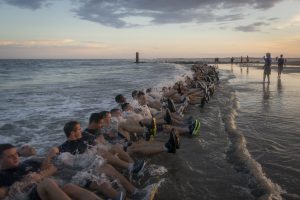It’s June in Charleston, and two 8th-grade boys wearing goggles huddle in the corner of a classroom in Thompson Hall, one watching a laptop, and the other, the blinking lights of a small drone as it quickly ascends before it lunges forward and makes a figure-eight, then drops without warning. The boy watching catches it easily. Their coding acumen has just scored them 100 points, putting them in the lead against their fellow campers in a contest designed to test their programming ability.
The camp, a weeklong GenCyber camp hosted by The Citadel and funded by a $63,367 grant from the National Security Agency and the National Science Foundation, incorporates a multidisciplinary approach. With faculty from the Swain Family School of Science and Mathematics, the Zucker Family School of Education, and the School of Humanities and Social Sciences, campers learn about first principles of cybersecurity, network security, coding, cryptography, cybercrime, cyber ethics and cyber law.
When Luanne, a 9th grader whose hobbies include beekeeping and horseback riding, is asked what her favorite subject is in school, she says that it is a toss-up—she enjoys literature, mathematics and technology, and, in particular, coding. It is no surprise, then, that Luanne is one of 57 8th-12th graders who applied to the GenCyber camp.
Like her fellow campers, Luanne enjoys learning to code a drone, but she is also quick to point out the unexpected lesson she learned about the value of teamwork.
“We were put in groups and had to work together to solve problems,” she says. “It’s beneficial because in any career you choose, you have to learn to communicate with people and know their opinions to make a difference.”
Teamwork is also important when it comes to addressing the shortage of cybersecurity experts. As cybercrime escalates, so too does the shortage of cybersecurity experts. From the federal government and the military to state and local governments and private industry, the cyber defense field has a strong presence in today’s work force. The GenCyber program, which provides cybersecurity camp experiences for students and teachers, was created to bring visibility to the field and ensure that the next generation of cyber defense experts will be ready to face the nation’s security challenges.
Jordana Navarro, a professor of criminal justice, captures the attention of campers when she teaches a lesson on cyberstalking. With only the first and last name of one of the instructors assisting with the camp and 10 minutes on the internet, Navarro is able to find the instructor’s date of birth, address, phone number, place of employment and pictures of her family. That information in the wrong hands can make most people vulnerable. Cyber stalkers are offenders who usually suffer from psychological problems; they exploit technology to harass, seek revenge and even destroy their victims.
To demonstrate how easy stalking is, Navarro tasks campers with finding information on the internet about themselves and their family members. Keegan, a 9th grader who likes sports, gaming and surfing, discovers where his parents lived as children and learns about ancestors he didn’t know he had.
“Cyberbullying is a worldwide problem. I’ve learned how easy it is to find someone’s information, how easily it could be avoided and how important it is to have secure passwords,” he says.
Cyber theft is another important topic covered in the GenCyber curriculum.
“We learned that victims of cybercrimes are not always aware that their information has been compromised until a crime has taken place,” said TréShawna, a 10th grader who wants to be a mathematician or a veterinarian. “Don’t put your information out there.”
This year The Citadel was the only South Carolina college to receive a grant for the GenCyber camp. In 2016, the college was designated a National Center of Academic Excellence in Cyber Defense Education by the National Security Agency and the Department of Homeland Security, the second college in the state to earn that distinction. The college also teamed up with the five other senior military colleges (University of North Georgia, Norwich University, Texas A&M, Virginia Military Institute and Virginia Tech) along with congressional leaders to create an amendment authorizing the secretary of defense to establish cyber institutes at the senior military colleges.The Senior Military Colleges Cyber Institute amendment is expected to be included in the fiscal year 2019 National Defense Authorization Act.
“The main goal of the GenCyber program is to increase interest in cybersecurity among K-12 teachers and students by teaching them principles of cybersecurity, cyber safety and cyber ethics,” says Lt. Col. Shankar Banik, Ph.D., who serves as co-director for The Citadel Center for Cyber, Intelligence, and Security Studies. “As a National Center of Academic Excellence in Cyber Defense Education, it is our responsibility to conduct outreach activities such as the GenCyber camp, where students learn how to be good cyber citizens and are inspired to become future cyber warriors.”

 A Dream Fulfilled
A Dream Fulfilled Sunset on Folly Beach
Sunset on Folly Beach On the Banks of the Ashley
On the Banks of the Ashley